September 1, 2011
New High of 55% of Americans Foresee Labor Unions Weakening
Forty-two percent want unions to have less influence; 30% want more
influence
by Jeffrey M. Jones
PRINCETON, NJ -- A majority of Americans, 55%, think labor unions will become
weaker in the future than they are today. That is up from 46% last year and the
highest Gallup has measured since it first asked the question in 1999.
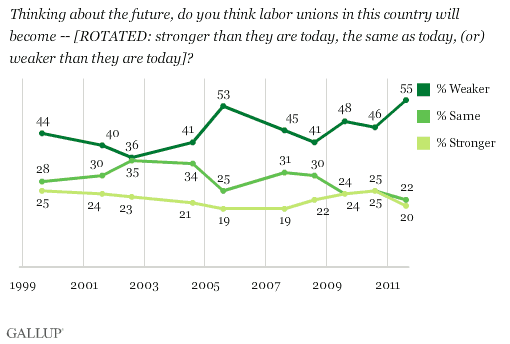
These results are based on Gallup's annual Work and Education poll, conducted
Aug. 11-14. Americans have always been more likely to expect labor unions to
weaken rather than strengthen, but not to as high a degree as they do this
year.
The new high could be a response to the battles between state governments and
public employee labor unions that have occurred in several states this year. As
state governments have struggled to balance their budgets, public employees,
many of whom are unionized, have been forced to accept cuts in pay or benefits.
In Wisconsin, the government passed legislation to limit the scope of what
public unions can bargain for.
All party groups generally expect unions to become weaker in the future, with
Democrats slightly less likely to say this. Since last year, Republicans and
independents have become significantly more likely to believe unions will weaken
in the future, with a smaller increase in the percentage of Democrats holding
this view.
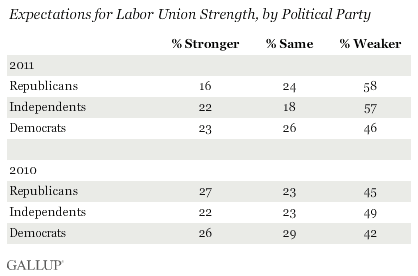
Americans Want Unions to Have Less, Rather Than More,
Influence
Forty-two percent of Americans would personally like to see unions have less
influence than they have today, tying the high from 2009. Thirty percent want
unions to have more influence, and 25% would prefer no change.
The last three years mark a significant shift in what Americans want to see
from labor unions. Since 2009, at least 4 in 10 Americans have preferred a
reduction in union influence, compared with no more than 32% from 1999-2008.
From 2005-2008, Americans were more likely to say they wanted unions to have
more, rather than less, influence.
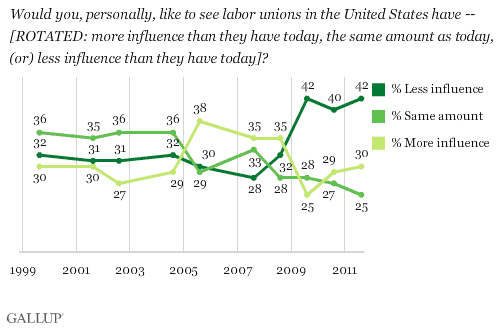
Republicans are solid in their preference for wanting unions to be less
influential, while independents lean in that direction. Democrats lean the other
way, with 45% wanting unions to be more influential.
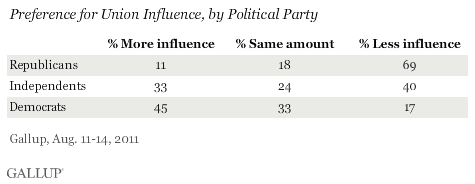
Americans See Unions as Mainly Benefiting Unionized
Workers
When asked to assess the impact of unions on various groups or entities,
Americans clearly believe unions mostly benefit workers who are members of
unions, and mostly harm workers who are not union members. The public renders a
mixed verdict on whether unions mainly help or hurt companies where workers are
unionized, states and cities where government workers are unionized, and the
U.S. economy in general.
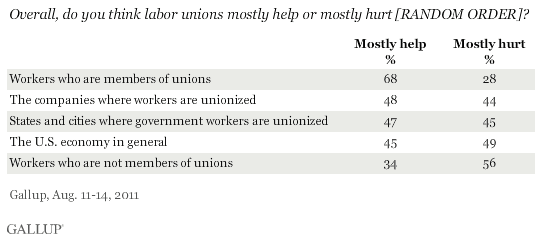
Americans were significantly more likely to see unions as helping rather than
hurting the economy and the companies where workers are unionized from 1999-2006
than they are today. In 2009, as Americans' general views of unions reached
a new low, so did their views of whether they help the economy and
businesses.
Implications
Americans' views of labor unions in the past three years are the least
positive they have been, with historically
low approval ratings and record highs in wanting unions to be weaker in the
future and expecting that to occur. This marks a shift from the past, when
Americans generally held positive views of labor unions and their impact on the
economy and workers.
The more negative views of unions could be tied to the health of the economy.
Gallup also found downturns in union approval in the 1970s and early 1980s, when
the economy was struggling. The expectation for weakening union influence may
also reflect the realities of union strength in a weak economy, as public
employee unions, typically some of the strongest and most successful unions,
have had to accept reductions in member benefits to help governments stay within
their budgets.
Copyright © 2011 Gallup,
Inc. All rights reserved.